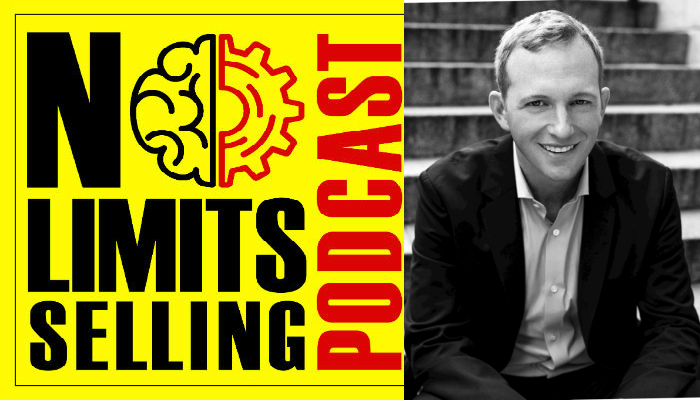Jason Sherman, CEO at Real Living | At Home
On Episode 30 of The No Limits Selling Podcast, we have Jason Sherman, CEO and Founder at Real Living | At Home. Jason serves as Principal Broker and CEO of RLAH Real Estate. A seventh generation Washingtonian, Jason graduated from the George Washington University in 2000 and received his J.D. from the Columbus School of Law in 2003. Jason is admitted to both the Maryland and DC bar associations. In 2004 he joined a well-established title company where he practiced until founding RLAH Real Estate in the fall of 2012.
In addition to his duties for RLAH Real Estate, Jason involves himself as much as possible with the real estate community. He moderates seminars teaches classes and serves on multiple committees for GCAAR; including his role as Chair of the Forms Committee (2017). Jason also served on the Board of Directors for GCAAR (2015-2017) and Bright MLS (2017- present). Jason is also a member of DCAR and NVAR.
When Jason is not working, he enjoys time with his wife, two children, two dogs, and two horses. He is also an avid swimmer.
Podcast Highlights:
- Its a volatile time in our industry, don't fight it embrace it
- Introverts make great realtors
- To succeed you must have faith in yourself

Contact Jason:
[EDITOR’S NOTE: This podcast is sponsored by No Limits Selling. It is a fun, fast-paced podcast that delivers hard-fought business advice that you can implement today to improve your sales and performance]
Interested In Our Real Estate Coaching Services? Explore Our Website: Link
Feeling Not Well Today? You Can Use Our Mindset Boosters App To amp Up Your Mood: Link
Find us on Social Media:
LinkedIn | Facebook community | Instagram
Like what do you listen to? Subscribe to our podcast!
Ready to become fearless? We can help you become fearless in 60 days so you accomplish more in your career Schedule A 15 min Call with Umar
Summary
Introduction
The podcast is a conversation between Umar Hameed, the host of the No Limit Selling podcast, and Jason Sherman, the CEO of Real Living | At Home. The podcast begins with Hameed welcoming Sherman and discussing the unique approach of Real Living | At Home, which differentiates it from traditional realtors.
Mindset and Success
Sherman emphasizes the importance of mindset in achieving success, not only in real estate but in life in general. He shares his experience of transitioning from being a title attorney to starting a real estate brokerage. Despite facing skepticism and the potential for failure, Sherman's commitment and faith in himself and the process helped him succeed. He believes that every day presents an opportunity to rely on one's mindset to overcome challenges.
Learning from Successful People
Sherman expresses his interest in studying successful people, observing how they navigate through stressful times and maintain positivity. He shares an impactful lesson he learned as a teenager about focusing on where you want to go rather than what you want to avoid. This mindset has helped him in life and in business.
Hiring and Team Building
Sherman discusses the challenges of hiring new agents, particularly those without a history of success in the industry. He seeks advice from Hameed on how to assess potential hires. Hameed suggests looking for a hunger for learning and resilience in candidates. He also recommends putting them to the test quickly and observing their use of "I" versus "we" when discussing team achievements.
Underperforming Team Members
The conversation shifts to dealing with underperforming team members. Sherman asks Hameed for advice on how long to give an underperforming individual before deciding they are simply not up to the task. They also discuss the possibility of the individual being in the wrong position within the team.
Conclusion
In conclusion, the podcast features a rich discussion between Umar Hameed and Jason Sherman, exploring the significance of mindset in achieving success, the value of learning from successful individuals, and the challenges and strategies in team building and managing underperforming team members. Sherman shares his personal journey of transitioning careers and establishing a successful real estate brokerage, emphasizing the importance of staying positive and focused on goals. The conversation provides valuable insights into hiring practices, team dynamics, and the importance of resilience and a learning mindset in potential hires. The podcast serves as a resource for listeners seeking to understand the intricacies of leadership, team management, and personal development in the business world.
Questions & Answers
What is the main topic of the No Limit Selling podcast featuring Jason Sherman?
Who is Jason Sherman and what is his role in Real Living | At Home?
How does mindset contribute to success according to Jason Sherman?
What advice does the podcast offer about hiring new agents or employees?
How does the podcast suggest dealing with underperforming team members?
What are some key takeaways from the podcast with Jason Sherman?
Don’t miss this opportunity to transform your real estate career with one-on-one coaching. As an experienced real estate coach, I, Umar Hameed, am dedicated to helping you unlock your full potential and achieve your real estate goals. To learn more about who am I and my clients ↓
If you’re ready to take the next step, book an appointment with me today and begin your journey toward success in the real estate industry.
